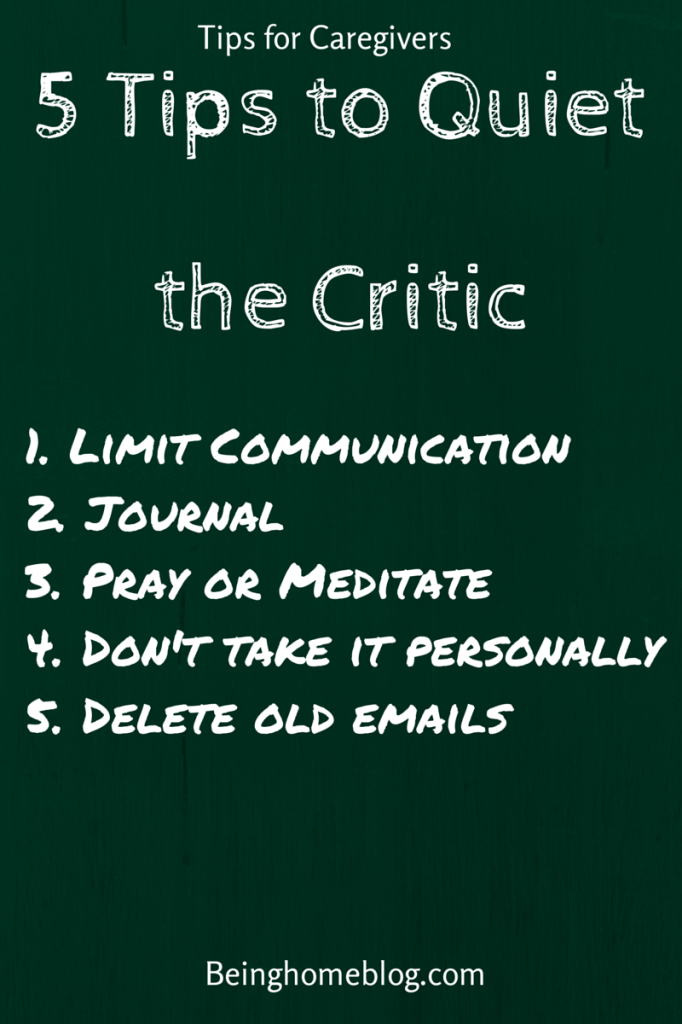In my last post, I cautioned against wasting energy on people who don’t support your decision to care for an elderly family member.
Criticism or lack of support when you’re caring for anyone, especially an elderly family member, comes in various degrees and forms.
It can range from well-meaning family and friends who are concerned for your health and ability to take on a huge task to self-oriented people who seem to be concerned about how the change will affect them……and everything in-between.
Once you assume the responsibility, however, it’s critical to focus your energy on the person needing care, your immediate family (children and spouse) and yourself. Anything that distracts from that is a waste of emotional currency.
How can you combat the “tune virus” in your head that wants to justify your decision to take on a primary caregiving role or the manner in which you do it? These strategies might help.
1. Limit or eliminate communication with (and about) the critic
Resist the urge to continue to justify your decision. Accept that you may never convince the critic or other unsupportive person that your intentions are good (assuming they are), that you’ve made an informed decision and that you believe that it’s the best option given the present circumstances.
Engaging with the non-supportive person unnecessarily will use up valuable time and emotional energy better spent on keeping everyone under your roof healthy. Tempting as it is, don’t go there, I promise, you won’t be satisfied and you’ll likely churn up more conflict.
Best to be silent. It will allow your brain to move on to more constructive matters. There’s a lot of truth to “out of sight out of mind”.
2. Journal if you must
If you find that you spend a disproportionate amount of time thinking about your critics, journal about it privately if you have time. Your caregiving responsibilities may not permit time for journaling. Dedicating a few minutes to it, however, will help you in two ways. Putting your thoughts on paper (or in a word doc) may quiet that self-talk and allow your brain to move on. It will also be a record of what’s going on during a stressful time in your life.
It might remind you of how strong you never thought you were.
3. Pray
Or if you’re not a praying person, meditate. Either practice will turn negative thoughts or energy into positive action.
4. Don’t take anything personally
Even if criticism is directed at you, the source of it likely has more to do with the other person’s unresolved issues or life circumstances. Now isn’t the time to guide others through their own emotional baggage. Again, best if you limit contact (as much as is practical).
5. Don’t reread old emails, texts or voicemails
You may be tempted to reread old email exchanges or texts if you’re doubting the course of events. Taking the time to reread old emails and texts not only distracts from your responsibilities, it puts the issue back in the forefront of your consciousness and recycles those same negative feelings.
That trash icon is your friend. Unless you need the written communication to protect yourself legally, delete it.
Maybe you’re still receiving emails, texts or phone calls from a person who you know is still trying to have their way. That’s what Caller ID is for. Unless the person is abandoning their protests and extending an offer to help, I’d delete them, perhaps without reading or listening, with no reply.
“DELETE!” It literally wipes it off your “TO DO” list (don’t you have enough to do already?)
These strategies may seem harsh and are likely very different from how you normally respond to people and handle conflict. This is a time of intense self-preservation, though, when norms of appropriate social interaction are suspended.
Your closest family and friends will forgive you and are likely being proactive to protect you. In the next post, I’ll tell you about some strategies I’ve learned along the way to manage the stream of visitors when you’re caring for an elderly parent or relative.

